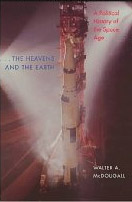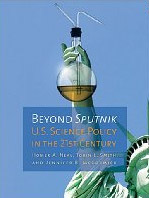Professor Jack Burns, Ph.D.
Department of Astrophysical & Planetary Sciences
Office: Stadium 120B
Office Hours: Monday 1 pm, Wednesday, 10 am, or by appointment
Phone: 303-735-0963
E-mail: jack.burns@colorado.edu
Web page: http://lunar.colorado.edu/~jaburns
Teaching Assistant
Teaching Assistant: Laura Kruger
E-mail: laura.kruger@colorado.edu
Required Texts:
Course Description:
Students will be exposed to current controversies in science that illustrate the scientific method and the interplay of observation, theory, and science policy. Students will research and debate both sides of the issues, which include strategies and spin-offs of space exploration, funding of science, big vs. small science, and scientific heresy and fraud. Approved for the arts and sciences core curriculum: critical thinking.
Course Prerequisites:
ASTR 1110 and 1120, or equivalent, or PHYS 1110 and 1120, or PHYS 2010 and 2020.
Course Objectives:
- How does NASA’s history give us perspective on the Agency’s present programs and its vision for the future of the U.S. space program?
- What is the rationale for federal support of scientific research in space, in particular, space astronomy? What fraction of the federal budget goes to basic science? To astronomy? What federal agencies support astronomy and what are their missions?
- How do scientists interact with policymakers in Congress and the White House? How are scientific priorities established? How is the budget allocated? How/when do scientists bring issues to the attention of policy makers? How/when do policy makers seek information from scientists?
- What are the scientific objectives, costs, and scientific impact of current space astronomy instruments such as the Hubble Space Telescope and Kepler, and such future missions such as the New Horizons Pluto probe, the James Webb Space Telescope, and lunar-based telescopes?
Strategies for Reaching the Objectives:
- Text chapters and other web materials should be read and thoughtfully analyzed before class so that you are prepared to discuss issues, articulate insights, evaluate others’ ideas, and defend your own ideas. Participate in discussions of topics by asking original questions, bringing in outside research articles to share with the class, and relating your own experiences or observations.
- Find time to read updates and articles on NASA and the space program at least weekly. You will be asked to discuss one or more such articles in class and how these articles relate to the learning objectives. Some potential resources include Space News (published weekly and in the library) as well as on-line sites such space.com, spacedaily.com, thespacereview.com, and http://science.nasa.gov.
- Make PowerPoint presentation to the class at least once during the semester showing your in-depth research on one of the themes, topics, missions, policies, or science issues in the class schedule.
- Begin research early on your mid-term and final papers.
- Late assignments will not be accepted unless arrangements were made in advance.
Class Web page:
http://lunar.colorado.edu/jaburns/astr4800
Exams:
Short essay examinations will be given twice during the semester, the first about a third of the way through the class and the second about two-thirds of the way through the semester. These exams will ask you to discuss, analyze, and interpret issues presented in class.
In-Class Participation:
Regular individual participation in class discussion is a critical part of this class. Points will be earned for the quality and quantity of your in-class participation. Participation will also include one or two brief (5 minute) presentations at the beginning of class on “Space in the News” – recent topical articles that describe “hot” issues in Space Science or Space Policy (see above for potential sources of articles).
List of Space in the News Student Presenters is given here: https://lunar.colorado.edu/jaburns/astr4800/files/Astronomy%204800%20Space%20in%20the%20News%20Presentations.pdf
Homeworks:
Homework assignments will be given on occasion throughout the semester. These assignments may include calculations, short essays, and interpretations of articles.
Class Presentations:
Every student will make at least one PowerPoint presentation to the class on one of a topics described below under Planned Class Schedule or will participate as part of a team in one of the debate topics. Careful preparation, including at least one meeting with the Professor, good presentation materials, practice, and reading materials for the class will all contribute to this portion of the grade.
List of Class Presentations and Student Presenters is given here: https://lunar.colorado.edu/jaburns/astr4800/files/Astronomy%204800%20Student%20Presentations.pdf
Papers:
Two papers will be written during the semester. The first midterm paper is a 5 page essay that describes an interview with a Space Scientist. Your interviewee must be approved in advance.
The final paper, in lieu of a Final Exam, will be a 10 page essay that will describe your vision of NASA if you were selected as NASA’s Administrator. It must present a vision and goals statement of your version of NASA, budget table for the next fiscal year (and four years beyond it), and strategy on how you will sell your budget and plans to Congress.
Individual Attendance:
Daily class attendance is expected and is an individual responsibility. An occasional interview or illness may cause you to miss class, but excessive absences will be penalized in the point distribution system. If you need to miss class, please let me know before class via E-mail or a written note.
Religious Observances:
Campus policy regarding religious observances requires that faculty make every effort to reasonably and fairly deal with all students who, because of religious obligations, have conflicts with scheduled exams, assignments or required attendance. In this class, please contact me in advance of the religious observation to make arrangements. See details at http://www.colorado.edu/policies/fac_relig.html.
Discrimination and Harassment:
The University of Colorado at Boulder policy on Discrimination and Harassment, the University of Colorado policy on Sexual Harassment and the University of Colorado policy on Amorous Relationships apply to all students, staff and faculty. Any student, staff or faculty member who believes s/he has been the subject of sexual harassment or discrimination or harassment based upon race, color, national origin, sex, age, disability, creed, religion, sexual orientation, or veteran status should contact the Office of Discrimination and Harassment (ODH) at 303-492-2127 or the Office of Judicial Affairs at 303-492-5550. Information about the ODH, the above referenced policies and the campus resources available to assist individuals regarding discrimination or harassment can be obtained at http://www.colorado.edu/odh
Classroom Behavior:
Students and faculty each have responsibility for maintaining an appropriate learning environment. Those who fail to adhere to such behavioral standards may be subject to discipline. Professional courtesy and sensitivity are especially important with respect to individuals and topics dealing with differences of race, culture, religion, politics, sexual orientation, gender, gender variance, and nationalities. Class rosters are provided to the instructor with the student\'s legal name. I will gladly honor your request to address you by an alternate name or gender pronoun. Please advise me of this preference early in the semester so that I may make appropriate changes to my records. See policies at http://www.colorado.edu/policies/classbehavior.html and at http://www.colorado.edu/studentaffairs/judicialaffairs/code.html#student_code.
Academic Integrity:
All students of the University of Colorado at Boulder are responsible for knowing and adhering to the academic integrity policy of this institution. Violations of this policy may include: cheating, plagiarism, aid of academic dishonesty, fabrication, lying, bribery, and threatening behavior. All incidents of academic misconduct shall be reported to the Honor Code Council (honor@colorado.edu; 303-725-2273). Students who are found to be in violation of the academic integrity policy will be subject to both academic sanctions from the faculty member and non-academic sanctions (including but not limited to university probation, suspension, or expulsion). Other information about the Honor Code can be found at http://www.colorado.edu/policies/honor.html and at http://www.colorado.edu/academics/honorcode.
When in doubt about plagiarism, paraphrasing, quoting, or collaboration, consult with me.
Disability Services:
If you qualify for accommodations because of a disability, please submit to me a letter from Disability Services in a timely manner so that your needs may be addressed. Disability Services determines accommodations based on documented disabilities. Contact: 303-492-8671, Willard 322, and www.colorado.edu/disabilityservices. Disability Services’ letters for students with disabilities indicate legally mandated reasonable accommodations. The syllabus statements and answers to Frequently Asked Questions can be found at www.colorado.edu/disabilityservices.
E-Mail:
I will be communicating weekly with you via E-mail on class assignments, reading articles, paper preparation, etc. It is essential that you log onto your official CU E-mail account at least twice weekly to read these communications!
Grading:
20% Class participation, homeworks, and Space in the News presentations.
25% Exams
20% Class Presentation
35% Mid-term and final papers








 University of Colorado
University of Colorado APS Department
APS Department